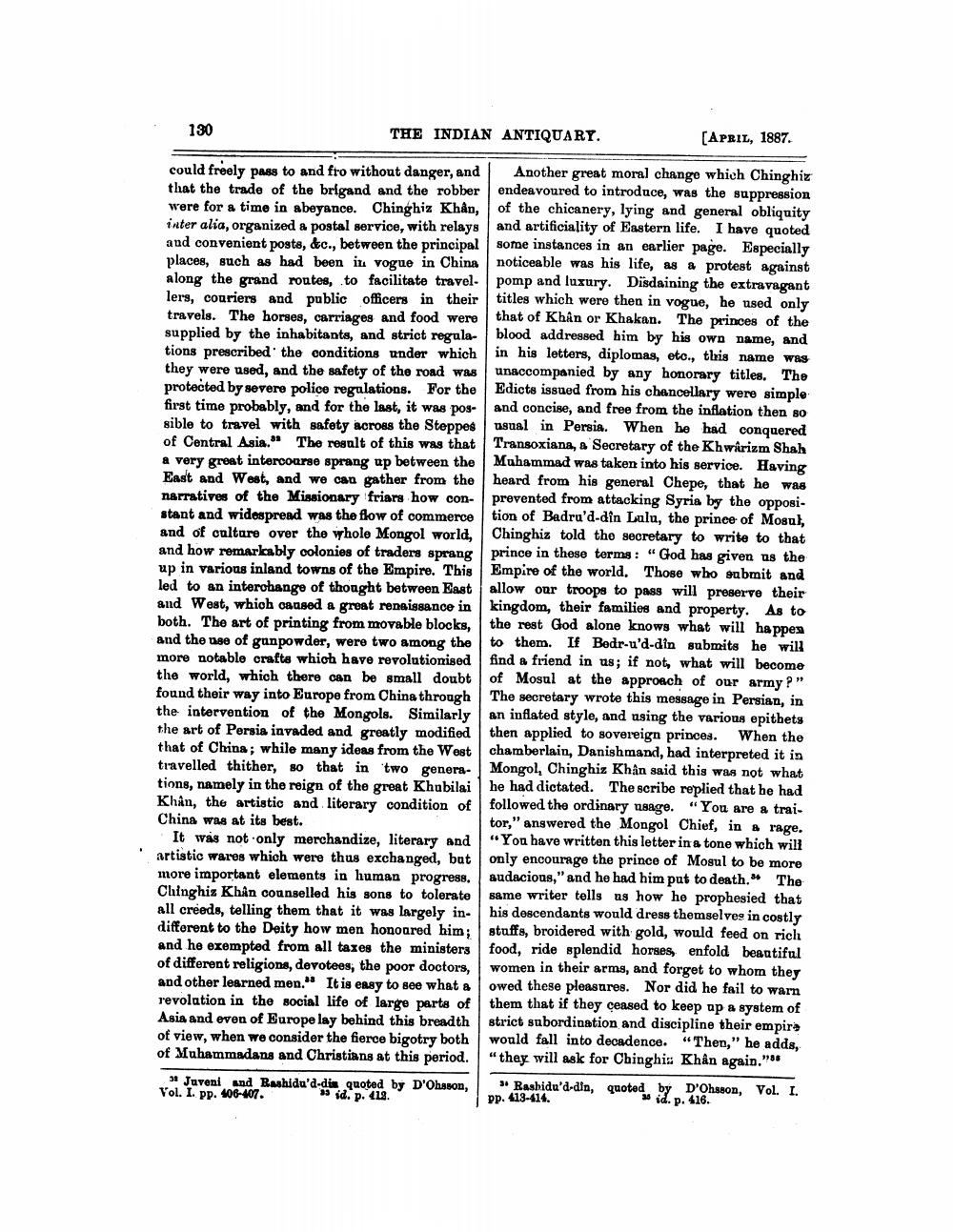________________
130
THE INDIAN ANTIQUARY.
[APRIL, 1887.
could freely pass to and fro without danger, and Another great moral change which Chinghiz that the trade of the brigand and the robber endeavoured to introduce, was the suppression were for a time in abeyance. Chinghiz Khân, of the chicanery, lying and general obliquity inter alia, organized a postal service, with relays and artificiality of Eastern life. I have quoted and convenient posts, &c., between the principal some instances in an earlier page. Especially places, such as had been in vogue in China noticeable was his life, as a protest against along the grand routes, to facilitate travel pomp and luxury. Disdaining the extravagant lers, couriers and public officers in their titles which were then in vogue, he used only travels. The horses, carriages and food were
that of Khan or Khakan. The princes of the supplied by the inhabitants, and strict regala- blood addressed him by his own name, and tions prescribed the conditions under which in his letters, diplomas, eto., this name was they were used, and the safety of the road was unaccompanied by any honorary titles. The protected by severe police regulations. For the Edicts issued from his chancellary were simple first time probably, and for the last, it was pos- and concise, and free from the inflation then so sible to travel with safety across the Steppes usual in Persia. When he had conquered of Central Asia. The result of this was that Transoxiana, a Secretary of the Khwarizm Shah a very great intercourse sprang up between the Muhammad was taken into his service. Having East and West, and we can gather from the heard from his general Chepe, that he was narratives of the Missionary friars how con- prevented from attacking Syria by the opposistant and widespread was the flow of commerce tion of Badru'd-dîn Lalu, the prince of Mosul, and of culture over the whole Mongol world, Chinghiz told the secretary to write to that and how remarkably colonies of traders sprang prince in these terms: "God has given us the up in various inland towns of the Empire. This Empire of the world. Those who submit and led to an interohange of thought between East allow our troops to pass will preserve their and West, which caused a great renaissance in kingdom, their families and property. As to both. The art of printing from movable blocks, the rest God alone knows what will happen and the use of gunpowder, were two among the to them. If Bodr-u'd-din submits he will more notable crafts which have revolutionised | find a friend in us; if not, what will become the world, which there can be small doubt of Mosul at the approach of our army?" found their way into Europe from China through The secretary wrote this message in Persian, in the intervention of the Mongols. Similarly an inflated style, and using the various epithets the art of Persia invaded and greatly modified then applied to sovereign princes. When the that of China; while many ideas from the West chamberlain, Danishmand, had interpreted it is travelled thither, 80 that in two genera - Mongol, Chinghiz Khân said this was not what tions, namely in the reign of the great Khubilai he had dictated. The scribe replied that he had Khán, the artistic and literary condition of followed the ordinary nsage. "You are a trai. China was at its best.
tor," answered the Mongol Chief, in a rage. It was not only merchandize, literary and "You have written this letter in a tone which wil artistic wares which were thus exchanged, but only encourage the prince of Mogul to be more more important elements in human progress. audacious," and he had him put to death." The Chinghiz Khan counselled his sons to tolerate same writer tells us how he prophesied that all creeds, telling them that it was largely in his descendants would dress themselves in costly different to the Deity how men honoured him; stuffs, broidered with gold, would feed on rich and he exempted from all taxes the ministers food, ride splendid horses enfold beautiful of different religions, devotees, the poor doctors, women in their arms, and forget to whom they and other learned men." It is easy to see what a owed these pleasures. Nor did he fail to warn revolation in the social life of large parts of them that if they ceased to keep up a system of Asia and even of Europe lay behind this breadth strict subordination and discipline their empire of view, when we consider the fierce bigotry both would fall into decadence. "Then," he adds, of Muhammadans and Christians at this period. "they will ask for Chinghis Khân again."
» Jareni and Bashida'd-dis quoted by D'Ohason, 1 Rashidu'd-din, quoted by D'Ohsson, Vol. I. Vol. I. PP. 406-407. » id. p. 412.
| pp. 413-414.




